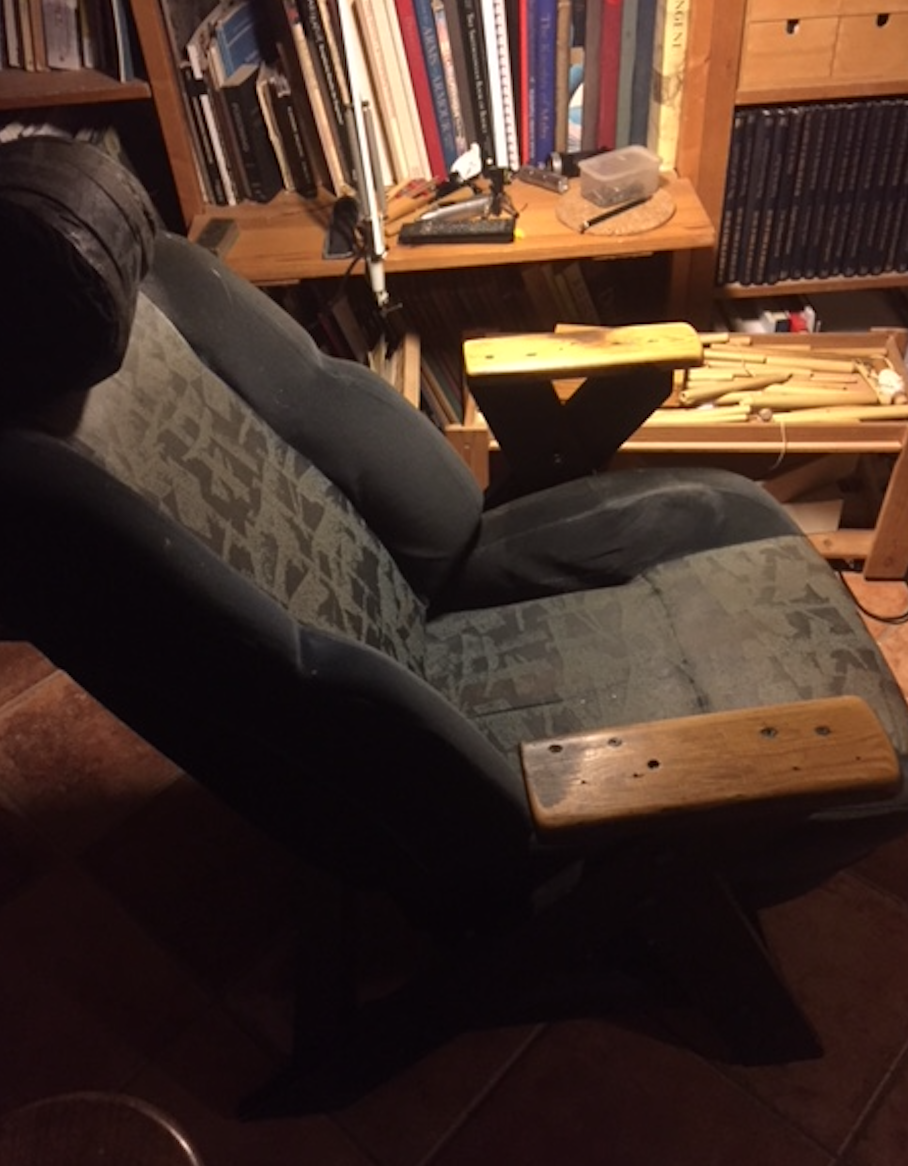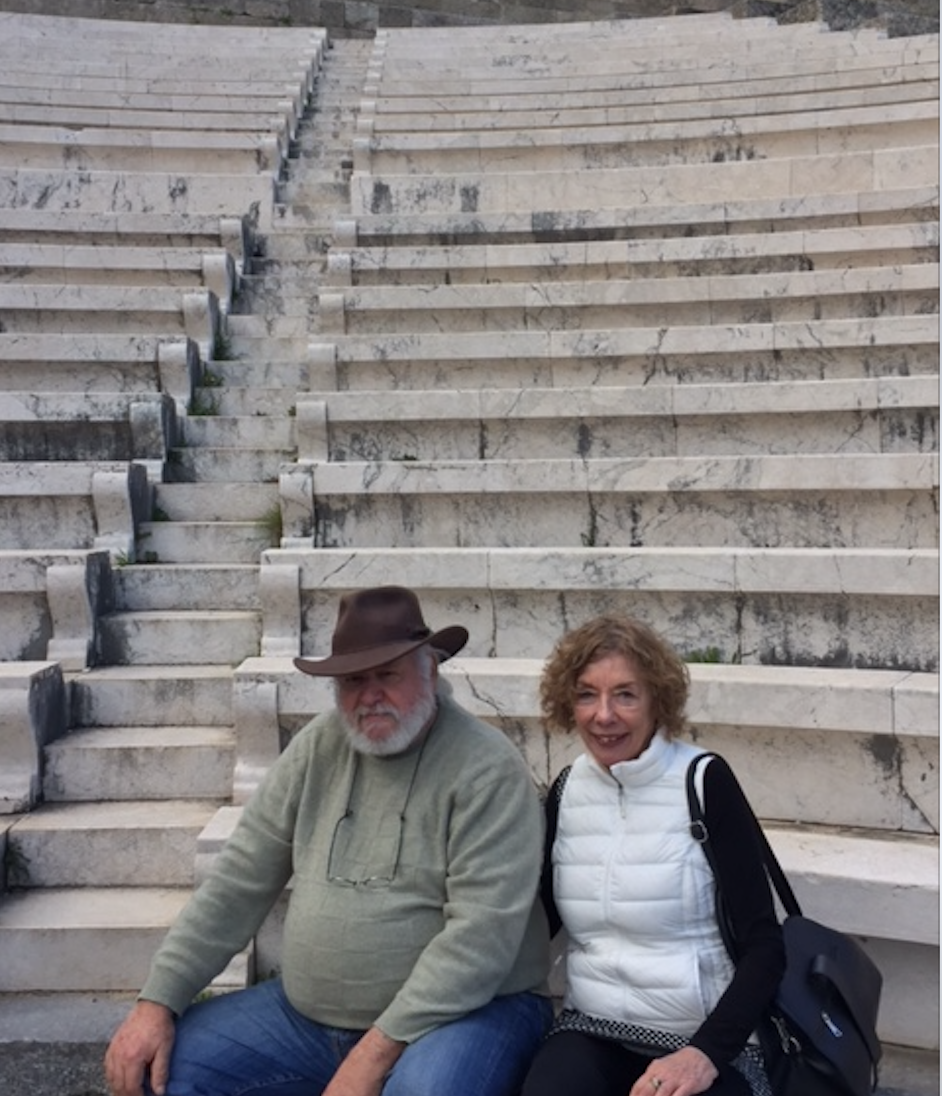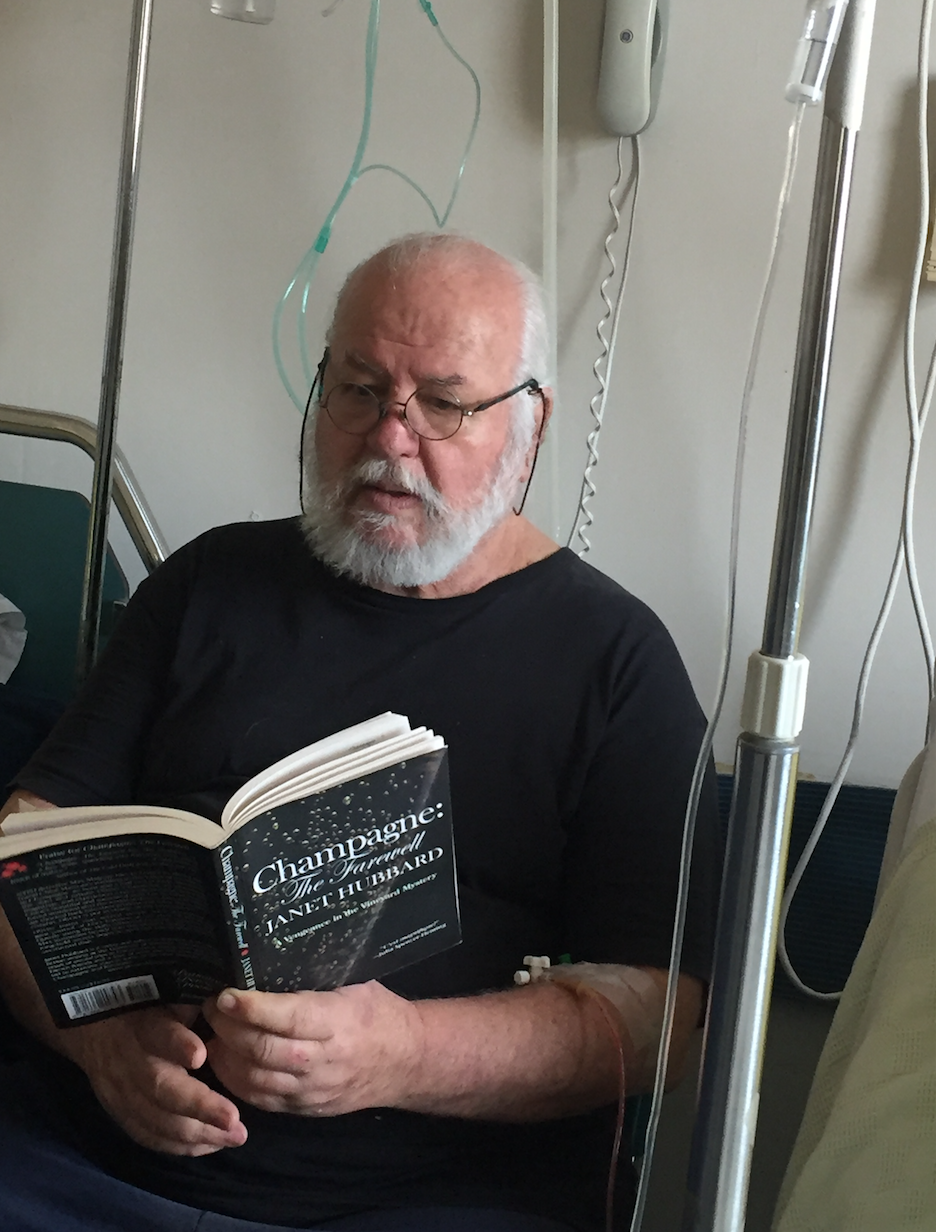A MODERN-DAY KNIGHT IN RHODES: A Tribute to Vangelis Pavlidis
Dear Friends,
On the January morning after my daughter, Ramsey, and I arrived in the village of Lahania on the island of Rhodes, there was a knock at the door. Ramsey opened it and a couple entered, saying they were friends of Maria, the mutual friend whose house we were staying in. With his hat dipped jauntily over his forehead, eyes full of curiosity, white beard, long white pony-tail, owl earring dangling from his left earlobe, Vangelis Pavlidis cut a rakish figure. He had a voice that matched his sizeable physique, and he spoke a carefully enunciated English. (“I learned two-thousand English words when I spent a year in Maine in my teens,” he told me later.) His wife Noomi, petite, soft eyes, Swedish, married to him for forty years (“I was one of many young Swedish women who arrived on Rhodes and became stuck,” she laughed.), invited us to join them that evening at the one café that was open in the winter.
The name Vangelis. My tongue wasn’t used to shaping it, and at first I heard myself saying, Van-jelly. The Kafeteria (Greek for café) was just up the hill, where tables were set up in an enclosed space in front of the owners’ home. We crossed the small terrasse where a few tables were set up for smokers and entered the glassed-in café where a fire roared in the corner chimney. We met Brit ex-pat couple, Maggie and Pete, who had moved to the area fifteen years before, John, another Brit ex-pat, who has worked at the local taverna for many years, but also was a goat-herder when he first arrived on the island. (Eventually Hans, who has maintained a home in Rhodes longer than anyone, arrived from Germany to complete our intimate circle.) The motley little gang we formed that night met frequently at the café, the taverna when the owner decided to open it on occasional weekends, in our various abodes, and in restaurants in other villages. One evening the six or seven of us were determined to watch the eclipse of the sun and the simultaneous rising of the moon, and so off we went (Vangelis wearing a cape and the signature hat) up vertiginous heights on narrow, winding roads with no railings. We climbed out of our cars at the top and stood in awe watching Nature’s performance. After we drove to dinner in another town.
Ramsey’s and my friendship with Noomi and Vangelis—aside from the coup de foudrefirst meeting—had a scintillating intensity to it that makes me, in retrospect, wonder if we were prescient somehow, living those six weeks with such a great sense of discovery and celebration. Because, after all, who would want to look for a chink in the armor, with all this merriment? Who among us wanted to admit increased vulnerability as we aged? Who wanted to think about upcoming surgeries, or spend too much time talking about near brushes with death? You see, Vangelis died unexpectedly on Orthodox Easter Sunday, a few weeks after turning seventy-five, a few days after he had posted adieu to a good friend from the village who had died of cancer, and approximately a month after I had left Rhodes to spend a month in Paris.
Ramsey and I agree now that we had existed in a magic bubble on Rhodes, which burst when we learned of Vangelis’ death. Flashbacks, barely old enough to have been filed under “memories,” flooded our minds when we learned of his death. Stories connect us, and a favorite winter pastime in the small village was telling the stories that unfolded in front of a fire. Like any place that seems tranquil to the visitor, I soon learned that the village was roiling underneath with love affairs, babies born out of wedlock (most of them grown up and returning—to their roots, as it were), French divas stirring up a tempest, antics of alcoholics, and yes, deaths of people gone too soon. (“Oh, you would have loved so-and-so.”)
We recalled Vangelis singing Greek songs with his friend Nikos in the café. Vangelis pulling out his harmonica and playing with passion. Vangelis cooking Greek dishes in his kitchen. Vangelis doffing his hat in front of his apartment in Rhodes City, indicating that he wanted to cross the busy street. Automobiles came to an abrupt halt as he bowed, hat in hand, calling to mind a chivalrous knight. Vangelis walking me through Old Town in pouring rain, telling me the history of some of the buildings.
When he told me that a seer had once looked at his hands and said the lines were either those of a genius or someone with Down’s Syndrome, I took a photo of his hands and sent them to renowned palmist (and friend), Jean-Jacques Guyot. When he sent a brief reading of Vangelis’ palms back to me, Vangelis read the text out loud beforereading silently to make sure there was nothing embarrassing. (That impressed me.) Here’s an extract from the reading: “This man is intense. What he wants with his mind he desires with all his heart. His mind is active with original ideas. But not everyone shares his views. This is the mark of a teacher, a psychologist, a researcher. The Venus mound is the archetype of beauty and pleasure, the mark of an artist. It makes him joyful, optimistic, passionately sexual and nurturing. This man loves food and comfort. Enjoy his company but do not argue with him too long. With his abundant energy he may exhaust yours before his own.”
Vangelis smiled broadly, recognizing himself. For one who was accustomed to capturing others on paper, someone had captured him.
He spoke with me one day about his childhood. His great-grandfather was the first Greek mayor of Rhodes and to this day Vangelis and Noomi maintain an apartment directly behind the grand house that had belonged to the family. Vangelis’ mother died young, and he was sent to live with an aunt in Athens for a year. But when he was reunited with his father, he and his brother said no when their father asked if they minded if he remarried. He never did. Vangelis grew up during the late 1940s playing in the Old Town section of Rhodes as a boy, before the medieval city had been restored to its current pristine status. (In 1988 it was designated a World Heritage Site.) He laughed when he told me he smoked his first cigarette in the basement of one of the buildings pre-restoration. As a boy he was crazy about films starring swashbuckling heroes like Errol Flynn. It’s no surprise that in his adult life he wrote and illustrated the definitive book on the fortified city of Rhodes, RHODES: A STORY (1306-1522.The knights in the story are the Knights of the Order of the Hospital of St. John of Jerusalem, eventually known as the Knights of Malta. (This wonderful book that took Vangelis ten years to complete can be ordered online.)
Fourteen years ago Vangelis and Noomi, after searching for two years, found land on a hilltop near the village of Lahania. They built an ochre-colored house that doesn’t resemble most of the other stark white houses in the area. Though you can see the Mediterranean Sea below, it is not a beach house, but a home nestled into the natural landscape. Pulling into the driveway and looking around, the first thing that catches the eye is a sign that says HIPPIES USE SIDE DOOR. Ramsey and I spent many wonderful hours in that house in front of a roaring blaze, sometimes hearing the soft clanging of the bells attached to the collars of goats that wander the meadows as we sipped ouzo. A vast porch on the back was created for dining al fresco, reading, lounging. Vangelis’ studio is a high-ceilinged and spacious room, with his desk positioned so that he could look out onto the sea. Various containers of pencils and brushes were lined up on a desk, ready for the next day. A mysterious rendition of an ancient sailing vessel occupied one wall and shelves of books lined the other. In the center sat an oddity, an automobile seat that Vanglis had converted to a chair/recliner. A humble thing, and at the same time a work of art-- perhaps something Warhol would have painted back in the Fifties. (Photographs are attached.) Ramsey said it was the kind of fantastical room filled with interesting objects that made her think everything came alive the minute we exited. One evening Vangelis and I sat in there chatting and it was during this conversation that I learned of his intolerance of the advertising career he started out in in Athens when he had finished school. He hated it and one day announced to his boss that he was going back to Rhodes. “What will you do?” his boss asked.
“I don’t know. Become a fisherman maybe.” He had been drawing from childhood on, and he studied art, but still didn’t feel that his style of drawing that reflected late Renaissance artists would be accepted anywhere. Then he saw the work of David Levine--“the GREAT Levine,” he said. He was referring to American cartoonist David Levine, whose cartoons appeared in magazines like The New York Review of Books. With his friends’ encouragement Vangelis sent his first drawing to a sports newspaper called Omadathat belonged to the big newspaper To Bima(Tribune), where he remained for most of his career.
Like many people in their seventies, Noomi, after having recently become semi-retired from her managerial position in her Airline Ground Services company, was still navigating retired life with Vangelis. Vangelis confided in me that after drawing cartoons for decades, with an audience of half-a-million people seeing them each week, it wasn’t easy for him either to adjust to a different life. He started a blog (highly recommended), liking the discipline of writing each day, though he had no idea how many guests it attracted. (website: http://pavlidiscartoons.com/blog/)He illustrated a children’s book called “Lighthouse Tales,” in collaboration with his son, Savvas (who was four at the time), which was published, as was a marvelous book on vampires. Other illustration jobs followed. And over years he has compiled a book of caricatures of famous people who liked to cook, or who were in some way associated with food, which he did not complete. He was an inveterate drawer even when in restaurants, picking up a napkin to draw on, and sometimes sketching on a plate.
One evening in front of the fire in his home I asked him what it meant to be a Rhodian. I had witnessed the men gathered in cafes in other villages late afternoons, laughing, and sometimes arguing, always gesticulating, and thought that was a clue to the character of the people.
Vangelis grew thoughtful. “That is more Greek,” he said. “What I think is a very good and nice thing about Rhodes is that Rhodes was always since the beginning in the middle of everything. We say in our world the Mediterranean is the cradle of civilization--the Middle East, Greece, Rome. Rhodes was in the middle of this. You could not avoid Rhodes. If you were going to travel from one end to the other you had to go through Rhodes. Rhodes has become a multicultural, and in the end, multi-national, if you like, place. We are not racist. In one way or another, even if it was a bad way…you know we have been occupied…even so, we are familiar in dealing with all kinds of people. The Arabs came by, the Turks came by, the Knights…all different nationalities… and now we have tourists from god knows where, from all over the place. And the Rhodians themselves, they are occupied now with tourism and everything else, but they were great sailors in former times. So they would travel all over the Mediterranean. We also had Rhodians with Magellan when he went around the world, we have the Rhodians with Columbus when he went to America. We were sailors, and this also contributed to meeting other people and civilizations and exchanges… many people from other cultures.
In our little Lahania you see how easy it is. You are an American, you see how easy it is to mingle with the people. You are smiled at, you are not asked questions, you are there, and that’s that. And I think this is the best thing about Rhodes.”
Typing his response brings tears to my eyes once again as I recall the moment when there was a knock at the door and what appeared to be a modern-day knight stood there, eyes twinkling. A couple of weeks ago Noomi sent me a photograph of Vangelis propped up in the hospital bed reading the first novel in my series, CHAMPAGNE: The Farewell.(see below).
I hope you will take the time to explore Vangelis’ website, and his published books.
I look forward to returning next month with tales of Paris!
Love, Janet




 Janet Hubbard
Janet Hubbard